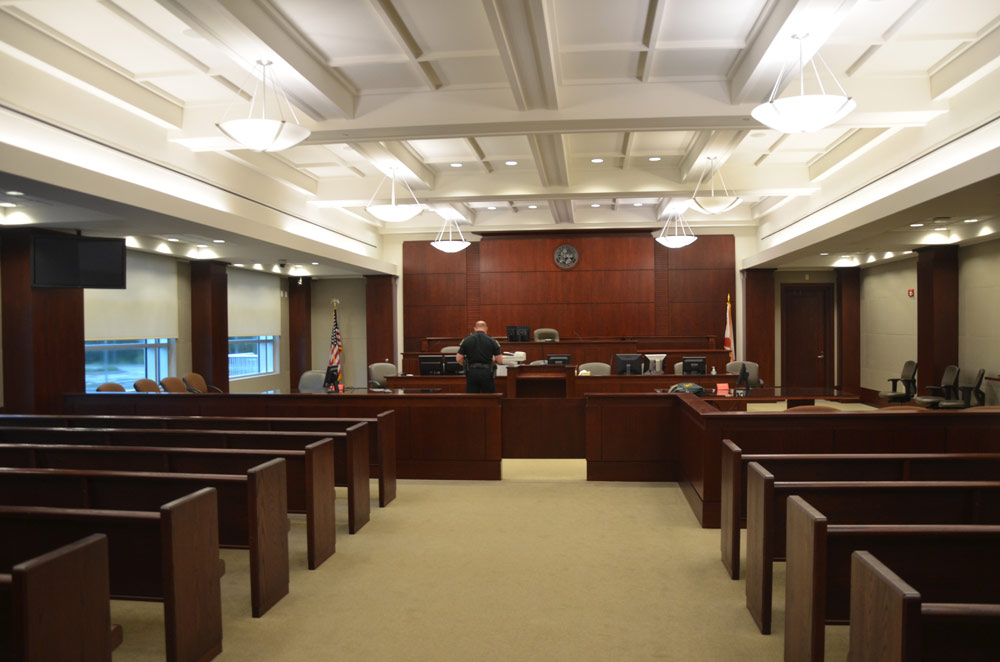
Pointing to a study of judicial workloads, the Florida Supreme Court this week recommended adding 50 judges across the state.
The Supreme Court each year goes through a process known as certifying a need for judicial positions to the Legislature, which has ultimate authority to decide whether to create — and fund — judgeships. But the number certified Thursday was far higher than in recent years.
Under the recommendation, the state would add 23 circuit judges, 25 county judges and two judges on the 6th District Court of Appeal, which is based in Lakeland and hears cases in parts of Central Florida and Southwest Florida.
The 7th Judicial Circuit, which includes Flagler, Volusia, St. Johns and Putnam Counties, was found to need two additional circuit judges but no additional county judges. It currently has 27 circuit judges (two assigned to Flagler County), 17 county judges (two in Flagler), seven senior judges, and five magistrates and child support enforcement hearing officers.
The recommendation came after the release in June of a study, the Florida Judicial Workload Assessment, that cited a need for 55 additional circuit-court judgeships and 29 county-court judgeships. In its unanimous opinion Thursday, the Supreme Court said it chose to “adopt an approach that is more incremental but still reasonable and fair.”
“The (Supreme) Court recognizes that funding new judgeships is a significant investment, and we are mindful of the Legislature’s challenge in addressing myriad state budget priorities with limited resources,” the opinion said. “Further, the court system’s capacity to absorb additional judges at one time is limited by factors such as courthouse space, with expansion of courtrooms and chambers subject to the availability of county funding. The (Supreme) Court also recognizes that establishment of new judgeships results in operational and potential fiscal impacts for justice-partner entities such as the clerks of the circuit courts, state attorneys, and public defenders.”
The additional judgeships would be spread from Miami-Dade County to Northwest Florida’s Walton County, under the recommendation.
For example, the Supreme Court called for adding seven circuit-judge positions in the 20th Judicial Circuit, which is made up of Charlotte, Collier, Glades, Hendry and Lee counties, and three circuit-judge positions in the 5th Judicial Circuit, which is made up of Citrus, Hernando, Lake, Marion and Sumter counties.
As other examples, it called for adding seven county-judge positions in Miami-Dade County, two county-judge positions in Duval County and two in Palm Beach County.
After decades of the state having five district courts of appeal, the Legislature in 2022 created the 6th District Court of Appeal and revamped boundaries of some districts. The Supreme Court said in Thursday’s opinion that the 6th District court requested two additional judgeships.
“In its request, the chief judge noted that the district court began its work on January 1, 2023, with nearly 1,700 transferred cases from two other district courts, and that filings in the district court continue to grow,” the opinion said. “According to the chief judge, the current judge complement is insufficient to keep pace with this growing workload.”
The Supreme Court, however, pointed to “excess judicial capacity” in the 2nd District Court of Appeal after creation of the 6th District court. It recommended addressing the 2nd District issue over time through attrition. The 2nd District court hears cases from areas such as Hillsborough, Pinellas and Sarasota counties.
During this year’s legislative session, lawmakers approved nine new judgeships, a move that went beyond a recommendation released in November 2023 by the Supreme Court.
The Legislature approved one circuit judgeship in the 1st Judicial Circuit, which is made up of Escambia, Santa Rosa, Okaloosa and Walton counties; one circuit judgeship in the 20th Judicial Circuit; three county judgeships in Orange County, two county judgeships in Hillsborough County; and one county judgeship each in Columbia and Santa Rosa counties. The Supreme Court had recommended one new circuit judge and five new county judges.
A state court rule requires what is known as the Commission on Trial Court Performance and Accountability to periodically review workload trends and “case weights.” Thursday’s Supreme Court opinion said a review was delayed because of the COVID-19 pandemic, with the case weights last updated in 2016.
The state contracted with the National Center for State Courts to help conduct the new assessment. The Supreme Court opinion said “revised case weights resulting from the comprehensive trial court workload assessment demonstrate that many cases have become more complex and require additional judicial engagement and time to resolve — warranting additional judges.”
The assessment said 608 circuit-judge positions and 342 county-judge positions were authorized as of July 1.
–Jim Saunders, News Service of Florida
![]()





























Ed P says
Does anyone else feel like the court system in general is reshaping our democracy?
How do the courts resist being viewed in a political or partisan fashion?
I get the sense that the degradation of societal norms and mores will continue to accelerate this trend.
Hard not to agree with Pierre that we have already embarked on the road to perdition.
James says
Just in time for the mass number of expected deportation trials?
Atwp says
Will the judges be all white people, men, white supremacies, klansmen, brainless Desantis and Trump puppets? What will be the future of my people under these judges? Will Jim Crowe become fully developed, and my people are denied any rights, including the right to live? Time will tell.